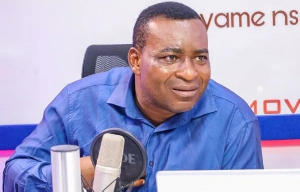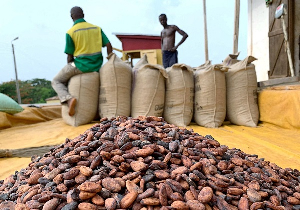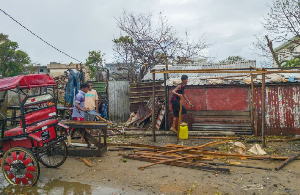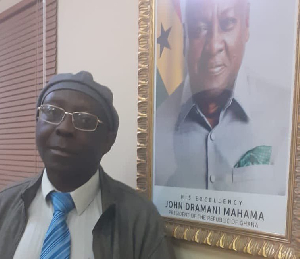Vibrant and well-resourced political parties play a very crucial role in the sustenance of democracy as they ensure not only a smooth transition of power but also enhance rapid socio-economic growth.
A prominent British economist, journalist and political scientist, Walter Bagehot, asserts this when he states that "Party organisation is a vital principle of a responsible government. There never was an election without party."
Ghana has, since the collapse of the first republic in 1966 through military coups d'etat, been ushered into short-lived constitutional rule in 1969 and 1979.
On each occasion, there were great initial expectations that democracy would thrive and be entrenched in the country. Surprisingly, however, the process was abruptly halted by the military, resulting in the proscription of political parties.
However, for the first time in its history, Ghana has experienced two successive terms of office of one elected party or government and a peaceful handover to another elected party through the ballot box. The spectacular transition of the National Democratic Congress (NDC) government to the New Patriotic Party (NPP) administration brings hopes of a new era of political maturity and stability.
Despite this optimism, other political parties such as the Convention People's Party (CPP), People's National Congress (PNC), and the Great Consolidated People's Party (GCPP) have not had it easy as they have virtually been dwarfed by the NPP and NDC in terms of finance, organisation and logistic support.
Their plight has been aggravated by a provision in the 1992 Constitution, which makes the public funding of political parties illegal. This is predicated on the fears that public financing of political parties could result in party hijacking by 'money bags.'
There is the need for significant measures by individuals, organisations and government to make political parties more viable.
It is in this spirit that the Friedrich Elbert Foundation teamed up with the National Electoral Commission to organise an international conference on "Political Parties and Democracy - The Role of Financial Rules and Regulations for Success of Multi-party Democracy" in Accra.
The Foundation aimed at identifying alternative strategies and experiences encountered with different approaches in other countries with a view to finding an appropriate mechanism to make political parties financially sound to ensure their survival.
Despite these efforts, political parties themselves have not demonstrated an appreciable degree of commitment, accountability and transparency.
The Daily Graphic, in its Saturday, May 6, 1994 edition, quoted the Electoral Commission as saying that "none of the eight registered political parties had submitted its accounts for 1993-94 as required by PNDC Law 28, Sect 19 (3)."
Another nagging problem impeding the development of political parties is the rapid demise of democratic experiment due to the character of the parties themselves as evidenced between 1979 and 1981.
Multi-party democracy in Ghana was and still is characterised by bitterness, animosity, acrimony and violence, especially during electioneering campaigns.
In the Third Republic, the ruling People's National Party was saddled with so many factional problems that it could not concentrate on its task of re-constructing Ghana. This partly accounted for a coup d'etat, leading to yet another breakdown in the attempt to restore democracy.
Politicians must learn from the past and watch their lifestyles and utterances so as to consolidate the country's fledging democracy and promote the rule of law.
The caution thrown by Mr Justice George K. Acquah, a Supreme Court Judge, that politicians should stop making wild and unsubstantiated allegations that could urge ambitious military adventurers to attempt to overthrow the government must therefore be taken seriously.
He told the Ghana News Agency that no matter the problems that politicians might face, no individual or group of persons have the right to resort to the use of military force to rule the country.
Instead, the security agencies should be encouraged to play a meaningful role in sustaining discipline, the rule of law and democracy.
The National Commission for Civic Education should be well resourced to enable it to intensify its civic educational campaign to ensure that the Constitution become a living document embossed on the minds and hearts of the people for the attainment of good governance.
It should also educate the electorate on the need to participate in the election of their representatives. The low turn up in the last district level elections is not a healthy development for our democracy.
Ghanaians should be reminded by the advice of Socrates that ''The price that the wise pay for not participating in an election is to be ruled by fools."
There is the need for a level playing field for individuals and competing groups in the democratic process and effective measures must be instituted to prevent governments from exploiting incumbency to their advantage and from using state resources to form and operate political parties.
Though such allegations are often refuted, ruling parties are seemingly the most organised, endowed financially and logistically.
Governments also to some extent wield great influence on the media, especially the state-owned ones, and other state institutions responsible for promoting democracy.
When the New Patriotic Party (NPP) was in opposition, it took the Ghana Broadcasting Corporation (GBC) to the High Court for allotting more time in its networks to the ruling National Democratic Congress (NDC), especially during electioneering campaigns, to the disadvantage of the minority parties.
Though the court ruled in favour of the NPP and ordered the GBC to give equal reportage to all political parties, the opposition parties, particularly the NPP continued to complain until it won elections in 2000.
Paradoxically, the NDC, which has swapped positions with the NPP as the main opposition party, has also joined the chorus of media neglect. For example, in 2001, the NDC criticised the GBC for failing to grant it a request to telecast fully the party's press conference.
The media should be well resourced and free from control to enable it to honestly and objectively play a significant role in preserving the country's democratic gains.
The Judiciary, Police Service and other state institutions should be assisted to contribute effectively to the promotion of democracy.
It is significant to note that the NDC has conceded that it is not easy to operate as a party in the opposition. The former Minister of Education, Mr. Ekwow Spio-Garbrah was reported to have told the Central Region delegates' congress of the party in Cape coast, that "We are actually in hell now, so we must find a way of gaining freedom to heaven."
The Bimbila by-election might have further given Ghanaians yet another food for thought on the issue.
Alhaji Huudu Yahaya, the then NDC General Secretary, in a radio interview said the NPP used unfair means to win the election, claiming that the victory of party forebode danger for the country's fledgling democracy.
Alhaji Yahaya accused the NPP of pumping too much money and resources into their campaign, adding that the NDC was going to analyse the situation and adopt appropriate strategies in subsequent elections.
Mr. Gabriel Pwamang, General Secretary of the Peoples' National Convention (PNC), also attributed the poor performance of the party in the by-election to the poaching of its candidate by the NPP.
But Mr. Dan Botwe, General Secretary of the NPP, denied the allegations that the NPP had shared money to people to buy their votes and said the practice had been the style of the NDC and was therefore assuming that the NPP would do the same thing.
The non-existence of a permanent building for the country's legislature after 45 years of independence and the lack of adequate facilities for members of Parliament to work with are major setbacks to effective multi-partism in the country.
The present Parliament House, which was not originally meant for Parliamentary business, lack enough rooms and offices to facilitate the work of the various committees of the House.
The announcement of Mr Peter Ala Adjetey, the Speaker of Parliament, that he would soon establish a committee of Parliament to work towards the planning and building of a permanent parliament building with all the necessary equipment has therefore brought relief to many democrats and Ghanaians in general.
The promise by the Electoral Commission to create more constituencies is welcome news because that would take account of population density thereby giving adequate representation in Parliament to enhance our democracy.
But in fulfilling its objective, the Commission should avoid gerrymandering that could give advantage to any political party.
There have been some attempts to assist political parties in the past as was evident during the last election when the government provided vehicles to facilitate electioneering campaigns.
An opportunity to create a level ground to turn the fortunes of political parties seem to be at sight with the government's determination to assist in the growth of political parties in Ghana.
Last year, President John Agyekum Kufuor asked political parties to contribute to a national debate to determine a practical method for funding their activities to sustain the country's democracy.
His call should not be taken lightly since he has been the leader of the NPP that was the main opposition party for some time, and knew the deprivations, the trails, tribulations and the frustrations of being in that political divide in a poor country like ours.
To maintain and sustain the current political dispensation towards a socio-economic development, there is the need for individuals, organisations and government to assist political parties to run their activities to enable them to ensure good governance and strengthen the institutions that make democracy thrive.
General News of Sunday, 5 January 2003
Source:












